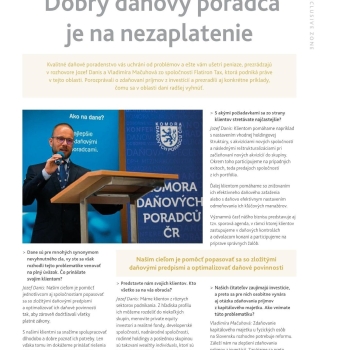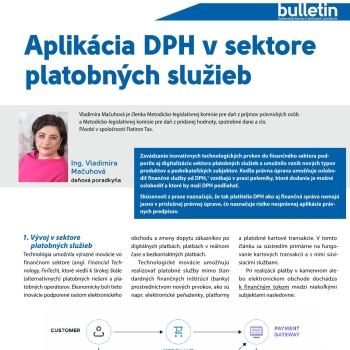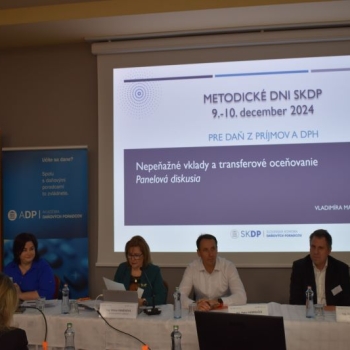
News

We are pleased to have been part of one of the most significant real estate transactions on the Slovak market – the sale of the Bory Mall shopping and entertainment centre.
Our colleague Jozef Danis acted as the tax advisor to the seller, while Flatiron Tax provided comprehensive tax support and coordination of transactional matters throughout the entire sale process.
The new owner is ZFP Real Estate Fund, managed by the Czech investment company ZFP Investments. On the buyer’s side, the process was coordinated by the Slovak investment company IAD Investments.
Bory Mall is one of the most prominent retail projects in Slovakia – offering more than 200 shops, restaurants, and services on an area exceeding 54,000 m², with a 97% occupancy rate and steadily growing visitor numbers.
(Photo credit: Penta Real Estate, https://www.pentarealestate.com/)
Flatiron Tax
Your partner in tax structuring and transactions.

We regularly provide expert insights on changes in tax legislation and business practice.
Throughout 2025, we had the opportunity to contribute to several media outlets – from MoneyERP and RTVS to the Construction Magazine.
Here’s a brief overview of our recent appearances.
1. Major Overview of VAT Updates Effective from 1 January 2025 (MoneyERP)
The MoneyERP portal published an extensive article summarizing the most important VAT changes effective from 2025.
The article explains the new rules for registrations, rate adjustments, tax corrections and amendments, and initial use of assets, among others.
Read the full article here:
Major Overview of VAT Updates Effective from 1 January 2025 (MoneyERP)
2. RTVS – Document Archiving: Filing a Tax Return Is Not the End
In RTVS Morning News, we discussed a topic that may not make the headlines but affects every entrepreneur – the archiving of accounting documents.
Filing a tax return is only the first step. Documents must be kept for 11 years after the end of the tax period, and some even much longer, for example:
• Real estate documentation – 20 to 40 years,
• Payroll records and employee files – 50 to 70 years.
3. Podcast: Tax News for 2025 (Construction Magazine)
In the Construction Magazine podcast, we discussed the latest tax changes for developers and construction companies.
The topics included:
• Application of VAT to real estate transactions,
• The position of individuals acting as “small developers,”
• VAT on construction works,
• Taxation of company cars,
• The new financial transaction tax,
• And tax optimization opportunities in 2025.
Watch the full video here:
Tax News for 2025 in the Construction Sector – Construction Magazine (YouTube)
📩 Follow our updates on LinkedIn or book a professional consultation:
👉 www.flatiron.sk
1_small.jpeg)
At first glance, the sale of shares or equity interests may appear straightforward – such transactions are generally outside the scope of VAT. In reality, however, things are much more complex. While the transfer itself is not subject to VAT, it can have a significant impact on the right to deduct input VAT, defining the boundaries within which holding structures can safely operate. Properly structuring the holding and assessing the nature of related costs often determine whether the company retains or loses its right to deduct VAT.
Sale of Shares and Equity Interests as an Economic Activity
When assessing VAT implications, the key distinction lies between passive ownership of shares or equity interests and active involvement in managing subsidiaries.
If a holding company merely acquires, holds, and subsequently disposes of shares or equity interests, this constitutes a pure investment activity – the management of a portfolio – which is outside the scope of VAT.
The situation changes substantially when the parent company provides its subsidiaries with administrative, accounting, IT, or marketing services that are subject to VAT. In such cases, the sale of shares or equity interests is no longer regarded as passive investment management but rather as an economic activity. According to the case law of the Court of Justice of the European Union (CJEU), this represents a “direct and immediate extension of the taxable activity.”
VAT Exemption for Trading in Shares
An activity may also be regarded as economic when a holding company or other entity actively trades in shares or securities. If such trading can be characterized as a business activity, it is no longer mere passive ownership typical of a traditional holding company. In this case, trading constitutes an economic activity that falls within the scope of VAT but is exempt from VAT under Article 39 of the Slovak VAT Act and the corresponding EU Directive. However, this also means no entitlement to deduct input VAT on related costs.
Deduction of VAT on Transaction Costs
A frequent question in connection with the purchase and sale of shares or equity interests is whether a holding company may deduct input VAT on advisory, legal, or valuation services.
The key test is the direct and immediate link between the expenses incurred and the company’s economic activity.
- If the expenses are directly attributable to a specific share or equity sale transaction that is VAT-exempt, no right to deduct VAT arises.
- If the expenses are part of the general overhead costs – such as due diligence or strategic advisory – that are incorporated into the prices of services provided to subsidiaries, the input VAT may be deducted.
This approach reflects the principle of VAT neutrality, which grants taxpayers the right to deduct input VAT on purchases related to taxable activities.
A landmark decision in this respect is CJEU case C-249/17 (Ryanair Ltd), which confirmed that when a company intends to provide the acquired subsidiary with management or administrative services subject to VAT, it is entitled to full deduction of input VAT on consultancy costs – even if the acquisition ultimately does not take place.
How to Structure a Holding from a VAT Perspective
- Decide whether your holding will remain a pure investment vehicle (without the right to deduct VAT) or act as an active service provider (with partial or full deduction entitlement).
- In any sale of shares or equity interests, pay close attention to transaction-related costs and the possibility of VAT deduction, to avoid disputes with the tax authority and the risk of penalties.
- Document your intention to provide subsidiaries with VAT-able services – this documentation may be decisive evidence in the event of a tax audit.
Conclusion
The sale of shares and equity interests is not subject to VAT and generally carries no entitlement to input VAT deduction.
However, the right to deduct VAT on expenses incurred during the acquisition and holding period depends on whether the holding acts as an active service provider to its subsidiaries.
Proper structuring of the holding and thorough documentation of the company’s intentions are therefore essential – otherwise, the tax authority may challenge the VAT deduction and impose additional tax liabilities and penalties.

We are pleased to share that the winter edition of Privatbanka Magazine features an interview with us. In the conversation, we spoke about what quality tax advisory means to us and why it pays to think about taxes in advance when doing business or investing.
We touched on topics such as:
✔️ structuring holdings, acquisitions, and reorganisations,
✔️ representing clients in tax audits and proceedings,
✔️ reducing tax burdens and designing effective remuneration for managers,
✔️ VAT risks and the importance of thorough due diligence of business partners,
✔️ the reform of capital income taxation for individuals.
We also emphasised that “change is the only constant in the world of taxes” – and that is precisely why our goal is to bring clients timely solutions that protect them and help them grow.
👉 You can read the full interview in Privatbanka Magazine – Autumn/Winter 2024.

The modern financial sector is undergoing rapid digital transformation – from electronic wallets and payment gateways to processing platforms. This dynamic development also brings new challenges in the area of value added tax (VAT).
In the Bulletin of the Slovak Chamber of Tax Advisors (December 2024), we therefore focused on the topic of VAT application in the payment services sector.
Key questions addressed in the article:
- Which services are exempt from VAT?
– for example, if an acquirer performs financial transactions, as well as clearing and card schemes (Visa, Mastercard). - Which services are subject to VAT?
– technical and support services provided by service partners, payment gateways, or intermediaries who do not directly execute money transfers.
Why is this important?
Correct VAT treatment of payment services is crucial both for businesses and for the tax authorities. Ambiguities in the legal framework can lead to divergent interpretations, issues during audits, or even significant tax risks.
In the article, we emphasise that:
- VAT exemption can only be applied to services that directly cause legal and financial changes,
- each case must be assessed individually,
- thorough analysis and professional advice help minimise risks in this complex area.
👉 You can find the full article in the SKDP Bulletin – Autumn/Winter 2024 at this link.

At the Methodical Days of the Slovak Chamber of Tax Advisors, held on 9–10 December 2024 in Zvolen, we had the opportunity to give a presentation on the topic of non-cash contributions and transfer pricing.
The discussion focused mainly on the question of whether non-cash contributions fall under the transfer pricing rules pursuant to the Slovak Income Tax Act.
A panel discussion with representatives of the Ministry of Finance of the Slovak Republic, the Financial Administration, lawyers, and tax advisors created space for professional arguments and the exchange of experience. It also highlighted the need for methodological guidance that would bring more legal certainty for companies in reorganisations and asset contributions to corporations.
The issue of non-cash contributions thus remains one of the key challenges of tax legislation in practice.

Under the recent opinions issued by the Slovak tax authorities, interest on acquisition loans are considered to be tax non-deductible. This treatment applies not only to the acquisition SPV itself but also to the situation when the merger of the Acquisition SPV and the Target is completed.
Obviously, the above opinions have a significant impact on all LBO (leveraged buyout) transactions and debt-push down strategies.
However, is the conclusion of Slovak tax authorities correct? We do not think so!
We will discuss this topic in more detail within our presentation on the 3. Conference on International Taxation that is organised by the Slovak Chamber of Tax Advisors on 7 November 2019.
Jozef Danis

In case of definitive non-recovery of receivables, it is possible to get back up to a third of the value from the State using the tax system
In addition to the possibility of tax deductible provisions and tax deductible write-off of receivables under the rules defined in the Income Tax Act, there is also a potential possibility in the value added tax (VAT) area. The Court of Justice of European Union (CJEU) has repeatedly ruled that in the case of unenforceable receivables EU member states are obliged to allow the correction of the tax base. This means the supplier should be returned the VAT paid to the state budget when supplying the goods or services. This ensures the VAT neutrality and adherence to the principle that no VAT is levied when the supplier has received no consideration for the delivery.
Rules for the correction of VAT on unrecoverable receivables still absent in the Slovak law, however, we believe that in this case it is possible to rely on the direct effect of the VAT Directive and the CJEU case law.
Vladimíra Mačuhová
